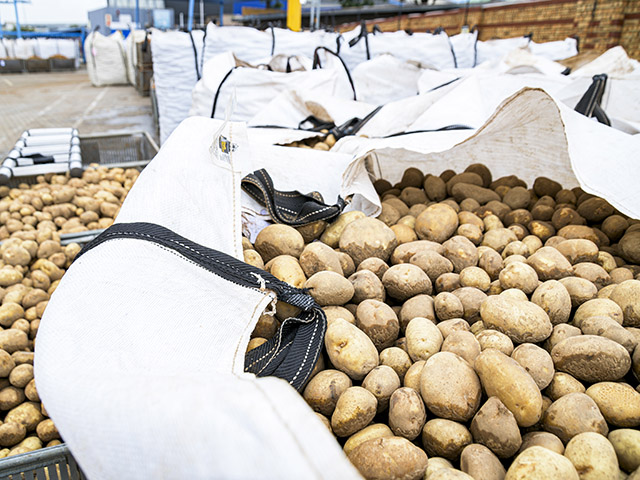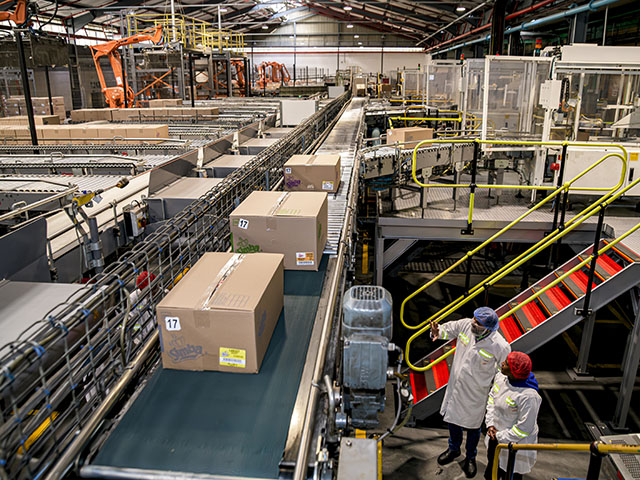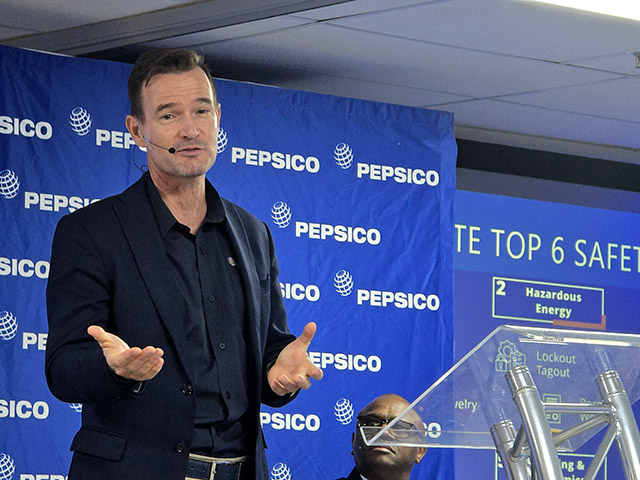PepsiCo - the technology behind the making of potato crisps
By Ryan Noik 14 May 2025 | Categories: feature articles
One of the fascinating aspects of living in a digital era is the amount that underscores and is behind so many aspects of life. Take, for example, a packet of potato crisps.
While it might seem like this simple snack is surely produced in a simple process, the truth is that what goes into making a single packet of potato crisps is anything but simple, and rather fascinating.
Recently, PepsiCo gave members of the media a detailed tour to show us their processes and operations, and how the always versatile potato becomes a delicious, slightly curved and flavored potato chip, completely sealed in shiny packaging and ready to be enjoyed.

Snacks - and much more
What many may not realise is that PepsiCo is responsible for a number of well-known brands, including White Star, SASKO, Simba, Lay’s, Bokomo, Weet-Bix, Liqui Fruit, Future Life and Spekko.
Furthermore, the company operates over 39 production facilities, including mills, bakeries, snack, and beverage plants, and maintains approximately 70 distribution and warehouse centres across the country and employes more than 11 000 South Africans. The company explained that its operations span five key categories. These include:
- Bakeries: Home to brands like SASKO, producing bread, specialty bread, rolls, and buns
- Grains: Featuring maize legumes and rice products under brands such as White Star, Imbo and Spekko
- Foods: Including cereals, sauces, spreads, and baking products from brands like Bokomo and Wellington’s
- Snacks: Producing a range of salty snacks, potato chips, and extruded products under brands like Simba, Lay’s, Doritos and NikNaks. In addition, the snacks portfolio includes dried fruits and nuts through its Safari brand
- Juice and beverages: Providing long-life fruit juices and other beverages through brands such as LiquiFruit, Fruitree and Ceres (export only)
In with the new while retaining the old
The company's manufacturing facility is located in a rather non-descript building in Isando. However, the real magic is what happens inside the facility, which recently received a massive R746 million investment in its newest PC5O Flex line. This, the company's management explained, means that the PepsiCo now effectively boasts a factory within a factory.
The older line is still operating and will continue to do so, along with the new PC50 Flex line, which has increased PepsiCo's snack capacity by 29%. While that is good news for the company and for the consuming public, the investment spelled some good news for the local economy too.
As investments often do, it has also created employment, adding 103 direct jobs and a creating more than 2 000 indirect opportunities through local SMMEs.
Shepherd Chikarakara, the manufacturing director for snacks/fruit at PepsiCo, explained to me that while its newest addition, and subsequent expansions, will boast increased automation, and more modern technology, this would not come at the cost of any jobs. Rather, PepsiCo plans to run its older lines alongside newer ones, retaining existing jobs and personnel while also taking advantage of artificial intelligence to increase its efficiencies.

Details, details
Chikarakara also explained some aspects of potato chip production I had never considered, such as its chips are deliberately curled slightly to retain more seasoning, and Simba's distinct striations similarly enables the crisp to hold more flavour.
Achieving the best possible potato chip is also dependent on precision - the oil temperature has to be at the exact temperature needed to ensure optimal cooking, and samples of the oil are tested at regular intervals at the facility's onsite lab.
We were shown how it is impossible for any external factors or unwelcome creatures to infiltrate the closed system. And the safety protocols instituted within the facility are stringent, with all workers wearing special protective gear to both protect themselves, and the food from contaminants.
Quality first
Every potato, and every chip, has to meet quality requirements. Potato's have to be at the top standard to be used, which gives new meaning to that old ad - I wants to be a Simba chippie - and they also have to be the right size, in order to qualify.
Similarly, every bag of chips is automatically weighed and checked that it is sufficiently sealed - any bag that doesn't pass muster is automatically rejected before it can be boxed. These assessments are all done via the use of technology in real time.
However, quality control isn't only done by machines - the final bag of chips, from Simba and Doritos to NikNaks and Lays, is inspected by a team of five to ten people who all assess the products, and check that its taste, crispness and texture meet the standards that PepsiCo sets. If it doesn't, that product range is failed and the line is stopped until the quality issue is resolved.

Nothing goes to waste
However, PepsiCo's technology doesn't stop within the facility. All rejected potatoes and waste material such as potato peels are used, and sent to the company's on-site anaerobic digestion plant that converts waste into biogas, which produces up to 30% of the site's peak energy demand.
The company stressed that the Isando facility also reflects its broader transformation agenda, with 100% water replenishment achieved in 2023, and 2024 – two years ahead of schedule, while PepsiCo has also achieved zero waste to landfill since 2022.
Apart from the fact that it eye opening to see the degree of technology, precision and dedication that goes into producing a seemingly innocuous packet of chips, there is a bigger story here too, and that is on South Africa's standing in the world. Having seen the inside workings of PepsiCo, I have no doubt that the country stands head and shoulders with world class food production.

Seeking a constant for the future
But what about food continuity and food security - especially given the state of tariff uncertainties, and how are we when it comes to our dependencies on the rest of the world for the snacks and staple foods?
Gareth Haarhoff, the General Manager: Snacks at PepsiCo offered us his perspective. He explained the food continuity depends on how much of a factory's raw material it is sourcing locally.
''We source all of our maize locally, and even export some of it. From a wheat point of view we source 55% locally and import the other 45%, but there are a variety of import opportunities. Port hassles aside we think there are adequate opportunities to import what we need into South Africa,'' he elaborated.
''When we look at rice, we import 100% but again I believe we are still in a decent position. Raisins and peanuts are all 100% locally sourced as well. From my perspective I think we are reasonably sound in South Africa from a food continuity perspective and between us and major competitors, I think we are in a healthy position from a food security position in South Africa,'' he continued.
Haarhoff also noted that during economic downturns, snacks continue to perform well and be popular with the public.
In a way, it seems like the humble potato crisp is the perfect metaphor for what people may need in the tumultuous times in which we live - something stable, reliably continuous and brought to us by a whole lot of technology and dedication.
Most Read Articles

Have Your Say
What new tech or developments are you most anticipating this year?



